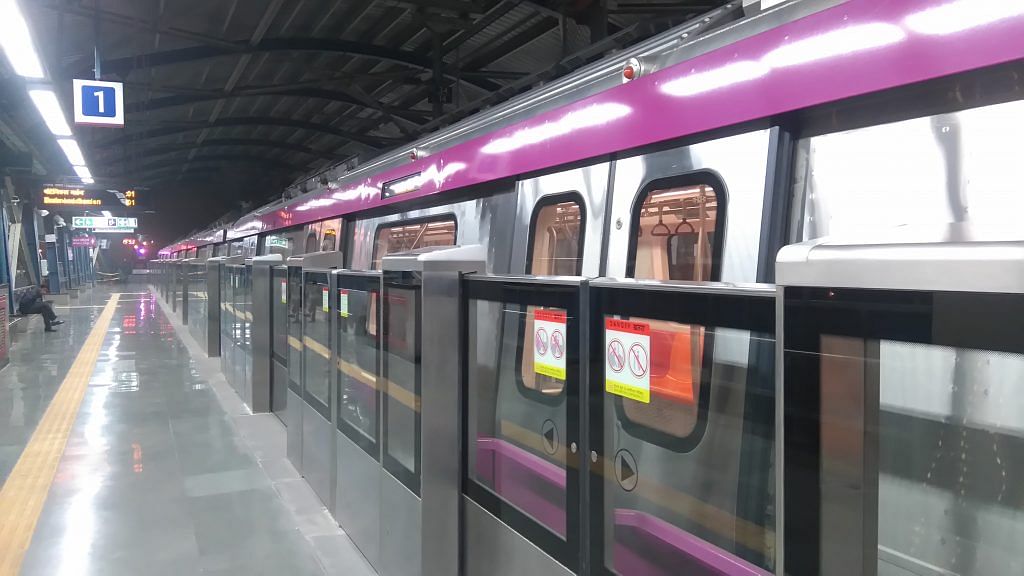New Delhi: The Delhi Metro Rail Corporation (DMRC) has written to the Delhi government to withdraw the nomination of four Aam Aadmi Party leaders to its board of directors.
In an official communication, additional secretary and DMRC director K. Sanjay Murthy has sought the intervention of Delhi chief secretary Vijay Kumar Dev and said the government should withdraw the nominations in Delhi Metro’s interest.
The four nominees are AAP leaders Atishi and Raghav Chadha, Naveen Gupta — son of AAP Rajya Sabha MP N.D. Gupta — and Delhi Dialogue and Development Commission (DDC) vice-chairman Jasmine Shah. They were recommended by Delhi transport minister Kailash Gahlot in a communication sent to the DMRC on 13 July.
Composition of the board
The board comprises 17 members, including five each from the central and Delhi governments. At present, DMRC managing director Mangu Singh and former finance secretary Ramesh Chandra are serving as Delhi government nominees.
The nominee directors from the government of India include Durga Shankar Mishra, housing & urban affairs secretary, the chairman of the board, Murthy, and Delhi Development Authority vice-chairperson Tarun Kapoor.
While Gahlot didn’t respond to calls and messages, a DMRC official clarified that even though only three posts were vacant, Chandra was being replaced, and hence, four new directors were needed for the board. “Bureaucrat or not, we will have to accept whomever they nominate,” the official told ThePrint.
Why did AAP govt nominate its own people?
Sources told ThePrint that the Arvind Kejriwal-led Delhi government had hoped that by nominating these persons, it would be able to push harder for central government approval for proposals, such as free Metro rides for women. AAP members said it was crucial to have its “own” persons, who could share the party’s vision more aggressively at meetings.
“Imagine a situation where you’re trying to implement policies, but the Centre, very subtly, using the IAS, is not letting things happen. So, what you do is you put your own people with the power of signatory authority and get your work done,” said a Delhi government official on the condition of anonymity.
Also read: Pink tokens, separate gates: Kejriwal outlines shape of Delhi’s free public transport scheme
Murthy’s objections
Murthy’s letter, accessed by ThePrint, said it was easier to hold government officers accountable when they were part of the board in their ex-officio capacity, which may not be possible with private individuals.
“It is pertinent to mention that directors bring not only domain knowledge and expertise but are also accountable to various tasks of the company for ensuring the time-bound implementation of the project,” he wrote.
Murthy said the DMRC is required to adopt guidelines issued by the Department of Public Enterprises to strengthen corporate governance. “As per DPE guidelines on composition of board of directors, dated 16 March 1992, officers dealing with the concerned enterprise or handling issues of the sector should be nominated as Government Nominee Directors,” he wrote.
The letter also stated that a convention has been established that the government nominates officers closely involved with the project and working in the areas of transport, infrastructure, finance or urban development as directors of all metro companies.
What the new directors want to accomplish
Meanwhile, the newly-nominated members of the board said they are keen to push for the free metro ride scheme for women among other things.
For Jasmine Shah, the top priority would be ensuring affordability and better accessibility to ensure the public benefits.
“Public transport is the lifeline of a city and I would want to derive a progressive formula while bringing down metro fares since there has been a hike,” he said, citing the case of Singapore, which looks at the minimum wage instead of letting the system remain a revenue-profit model.
Shah also said he wanted to ensure he can do whatever it takes to resolve issues affecting Phase 4 of the Delhi Metro and unresolved ones like last-mile connectivity, so that people find it more convenient to use the system.
Naveen Gupta said he wishes to focus on the financial aspects, given his expertise in this field. A former president of the Institute of Chartered Accountants of India, Gupta said there is no person from a financial background in the current audit committee, and hence, he would want to monitor the costing and rise in fares.
“It is important that the money a common man gives to the government in the form of taxes comes back to him,” Gupta told ThePrint.
“I feel a common pass or module should be there to help especially women and senior citizens get access to autos, rickshaws and even radio taxis for free, in order to enhance last-mile connectivity and security.”
Atishi didn’t respond despite multiple attempts to contact her, while Chadha said he would not like to comment until the formal announcement is made.
Also read: AAP govt ready for Delhi Metro freebie, but sits on Rs 200-cr proposal for feeder buses
